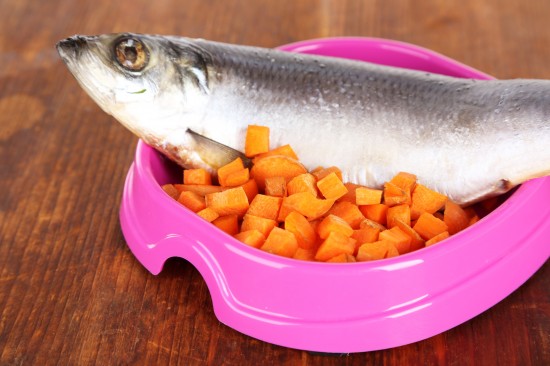Nutrition is one of the most important issues that must be addressed when considering the health of your dog. If you want your dog to live a long, active, and happy life, free from the common health problems associated with modern dog foods, then you should be feeding your dog home-made meals every single day.
Just like humans, dogs need a balanced diet that includes the right kinds of nutrients for continuous growth and tissue repair. A diet lacking in these can cause stunted growth, poor healing after injury, and a shorter lifespan compared to dogs that receive optimum nutrition.
Proteins are amongst the most important nutrients in a dog's diet. They are necessary for all aspects of growth and development, and are vital for structural make up and the proper functioning of the immune system. In addition, proteins are burned as calories and can be converted to and stored as fat.
Although for humans the intake of fat is generally looked upon negatively, it is a fundamental and crucial nutritional component of a dog's diet. Fats are actually concentrated forms of energy and are also needed for normal kidney processes, and to help your dog maintain a healthy coat and healthy skin.
Carbohydrates are also vital dietary requirements. Since dogs are generally active, they need a clean source of carbohydrates that can easily be converted to energy.
Pet owners are being fooled into thinking that pet food companies are supplying the very best nutrients for dogs in their brands of food. For example, the protein level listing on bags of dog food is not a listing of the percentage of digestible protein. The digestibility in quality foods is between 70 and 80 percent. In lesser-quality foods, it can drop to as low as 60 percent or less. This is an appalling state of affairs.
Many dog foods are made with chicken or other meat byproducts. And though these are acceptable, they are not high in quality. However, meat and bone meal, which are also used in dog food are poorer qualities of meat and therefore less digestible.
If grains are listed on the ingredients label, you should be aware that they are not good digestible sources of protein either. All they do is contribute to the carbohydrate load.
By feeding your dog a healthy, home-made meal, you are able to carefully monitor their nutrient intake and give them the correct portion size for their breed. In addition, you can steer your pet away from things like preservatives, additives, and artificial flavoring.
Many home-made dog food recipes call for healthy foods like bananas, honey, peanut butter, vegetables, apples, and pumpkins -- plus nutritious meats such as fresh beef, chicken, turkey, and fish. While some people choose to give their dogs home-made meals because their pets have been diagnosed with a health condition, require a special diet, or are in competition training, others simply understand that store-bought dog food is nothing more than processed, low-quality fare sprayed with fat to make it more appetizing. If you wouldn't eat it, why should your dog?

 A Brief Look At Delightful Indian Runner Ducks
A Brief Look At D
A Brief Look At Delightful Indian Runner Ducks
A Brief Look At D
 Can You Feed Fish To Your Dog, And Is Fish A Good Ingredient In Dog Food?
Can You Feed Fish
Can You Feed Fish To Your Dog, And Is Fish A Good Ingredient In Dog Food?
Can You Feed Fish
 Keeping Your Cat Cool And Comfortable During The Summer
Keeping Your Cat
Keeping Your Cat Cool And Comfortable During The Summer
Keeping Your Cat
 Dealing With A Road Traffic Accident Involving A Dog
Dealing With A Ro
Dealing With A Road Traffic Accident Involving A Dog
Dealing With A Ro
 Dealing With A Puppy That Is A Bully
Dealing With A Pu
Dealing With A Puppy That Is A Bully
Dealing With A Pu